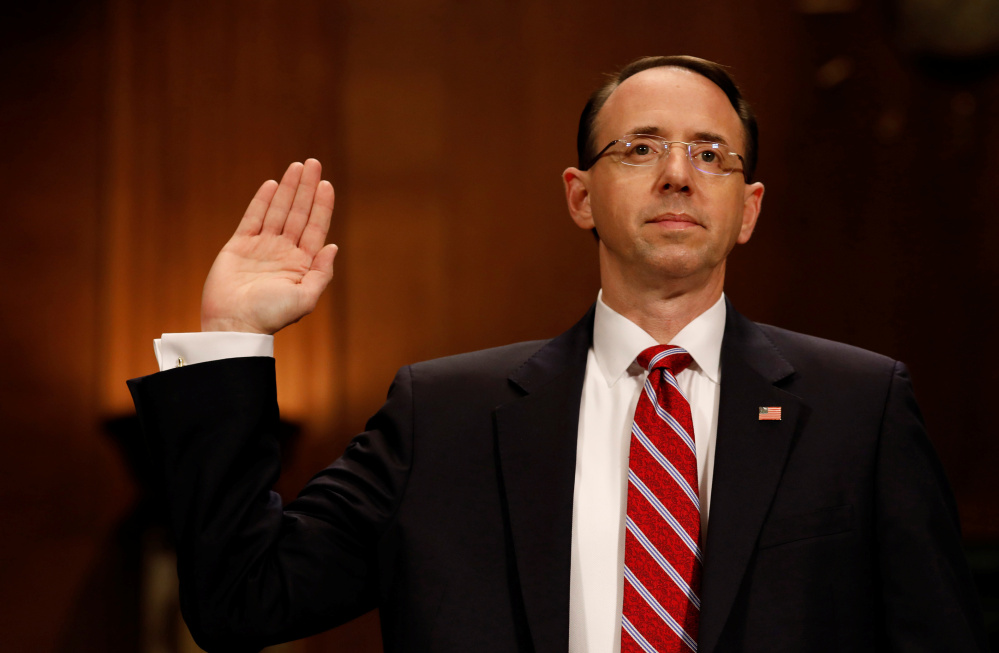President Trump’s sudden removal of James Comey as director of the FBI sparked immediate fears among legislators and others that the bureau’s probe into possible collusion between the Kremlin and the Trump campaign might be upended now that Trump himself can handpick its new supervisor.
The investigation is still in its infancy, but the probe’s sensitive subject matter has already created a political quagmire for the Justice Department. Attorney General Jeff Sessions recused himself from the case in March after it was revealed he had spoken twice with Russia’s ambassador to the United States and not disclosed that during his confirmation hearing.
The matter is now overseen by Deputy Attorney General Rod Rosenstein – the man who authored the three-page rationale for removing Comey from the bureau because of his handling of the Hillary Clinton email investigation.
On Tuesday, legislators on both sides of the aisle called for an independent body to investigate.
Sen. John McCain, R-Ariz, said he was “disappointed” in Trump’s decision and repeated his call for a special congressional committee to probe the matter. Sen. Richard Blumenthal, D-Conn., called for a special counsel.
Unless Congress intervened with some type of legislation –which U.S. Rep. Justin Amash, R-Mich., on Tuesday suggested is possible – the decision to appoint a special counsel would fall to Rosenstein because Sessions is recused.
COMEY ACKNOWLEDGED PROBE
Comey acknowledged publicly in March that the FBI was looking into possible coordination between the Kremlin and the Trump campaign, and he said the investigation had begun in late July. Comey said that for a counterintelligence probe, “that’s a fairly short period of time.”
Comey has said that attorneys from the Justice Department’s National Security Division and U.S. Attorney’s Office for the Eastern District of Virginia are involved in the case, in addition to FBI agents.
Rosenstein is a well-respected former U.S. attorney, who was nominated to that post by President George W. Bush but has served in both Republican and Democratic administrations. At his confirmation hearing, he declined to recuse himself from the Russia probe and offered legislators a patriotic reassurance.
“I don’t know the details of what, if any, investigation is ongoing, but I can certainly assure you if it’s America against Russia, or America against any other country, I think everyone in this room knows which side I’m on,” he said.
Several former Justice Department officials who know Rosenstein said they believe that the deputy attorney general was doing what he thought was right in blessing the firing of Comey.
“He did what he thought needed to be done, but it gives a huge political gift to the White House,” said one official, who like several others spoke on the condition of anonymity to offer candid assessments of their peers.
A number of other current and former officials said that the FBI special agents and National Security Division attorneys who are conducting the Russia probe will continue the investigation.
“There are extraordinarily experienced career people who were running the case yesterday and they’re still running it today and they will run it tomorrow,” a former senior Justice Department official said. “My sense is that Rod Rosenstein is not going to let his legacy be that he obstructed the Russia investigation by firing Comey.”
PROBE COULD SLOW DOWN
The probe, though, might slow down in the short term. Comey’s successor will undeniably play a major role.
“No big-time decisions will be made until they appoint a new FBI director,” said one former federal prosecutor. “It’s just a big thing.
The FBI will make a recommendation to the Justice Department as to whether or not to go forward, and you’re going to want an FBI director to make that kind of decision, I would think.”
The Justice Department and the FBI did not respond to requests for comment.
Even some Republican legislators said they had some concerns. Sen. Bob Corker, R-Tenn., said in a statement that it was “essential that ongoing investigations are fulsome and free of political interference until their completion, and it is imperative that President Trump nominate a well-respected and qualified individual to lead the bureau at this critical time.” He also noted that Comey’s firing would “raise questions.”
Inside the bureau, agents said that there was shock at the news of Comey’s dismissal and hoped it would not disrupt the Russia investigation.
“I like to think that the good men and women who are working on it will continue to do the same thing they’ve done,” one agent said. “My impression is that the director, while being a leader for the organization, doesn’t come down into the weeds and direct behavior, so I’m hopeful they’ll continue on the track.”
In his memo, Rosenstein lambasted the FBI director for his July news conference announcing that he was closing the Clinton email case without charges. He alleged that Comey “was wrong to usurp the Attorney General’s authority,” and he compounded the error by releasing derogatory information about Clinton.
Rosenstein also was critical of Comey’s decision to reveal in late October that the probe had resumed, and he dismissed the FBI director’s recent defense to Congress that not doing so would have effectively served to “conceal” important information.
That criticism was somewhat curious because in October, when Sessions was a Trump campaign surrogate, he praised Comey for doing what was necessary.
Send questions/comments to the editors.



Success. Please wait for the page to reload. If the page does not reload within 5 seconds, please refresh the page.
Enter your email and password to access comments.
Hi, to comment on stories you must . This profile is in addition to your subscription and website login.
Already have a commenting profile? .
Invalid username/password.
Please check your email to confirm and complete your registration.
Only subscribers are eligible to post comments. Please subscribe or login first for digital access. Here’s why.
Use the form below to reset your password. When you've submitted your account email, we will send an email with a reset code.